|
Devon Island is located in the Canadian high arctic, midway between Baffin Island and
Ellesmere Island. With an area over 20,000 square miles, it is one of the largest
uninhabited islands in the world. The only human presence is several scientific camps
that are usually only occupied for a few summer months.
After a one hour flight from Resolute, we landed at the Truelove Lowlands. We spent a
day and a half there getting organized, and doing a bit of exploration. We started hiking
in a southwesterly direction, climbed onto the high plateau, went westward to the Sverdrup
Glacier, explored several smaller icecaps, and eventually came down to the Cape Sparbo
and Cape Hardy area. This is all shown on the accompanying map.
|
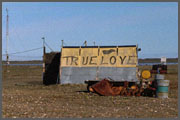
| Truelove Camp.
The Truelove Lowlands occupy roughly 25 square km on the north shore of
Devon Island. It contains many ponds and fairly rich vegetation (for the Arctic) that
attract a variety of wildlife. We observed various water fowl, and muskox. The area has
been extensively used by the native population for several thousand years, and we found
many ancient camp sites. Besides our group there were two other "tourists" at the Truelove
Camp. However, once we left there, we didn't see any other people until we were picked up
by the plane for our return trip.
|
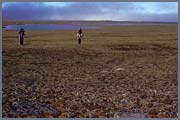
| Easy Hiking.
Our first day of hiking was very easy - level, dry, solid ground - a rare treat in the
Arctic. This is always a good way to start a hike, an opportunity to work out all the
kinks in both the pack and the legs. My pack was fairly light (about 65 lbs), so I was
able to enjoy the hike. I brought my new Bibler Eldorado tent to try out on this trip.
Its extremely light weight, and (supposedly) "hurricane proof". I was quite happy with
the tent on this trip.
|
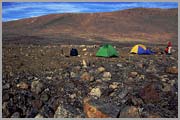
| Typical Campsite.
One of the major "problems" on any Arctic trip is finding a decent campsite. This trip
was no exception. After we left the Truelove Lowlands and started ascending onto the
plateau, the terrain became very fractured. Although not technically difficult, the
shattered rock required constant attention, so that one wouldn't trip over something.
I've always thought that the German word felsenmeer, literally "sea of rocks",
was appropriate for this type of terrain.
|

| River Crossing.
We were lucky on this trip - we only had a single stream crossing of any consequence. I
was able to cross this one without getting my feet wet.
|
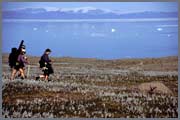
| Calm Ocean.
Another gorgeous hiking day. The ice is almost totally out of Jones Sound, and Ellesmere
Island looks close enough to touch, even though its 50 miles away.
|
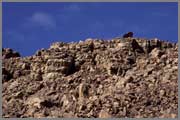
| Eye in the Sky.
There's a reasonable muskox population in this area. We saw several herds with 15 or
more members. At other times, there would be only a lone animal. This fellow was
looking down on us from the top of a cliff.
|
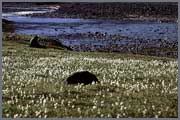
| A Quiet Moment.
At the end of the day, after camp is set up, its nice to just sit down, make notes in
the diary, and simply enjoy the scenery.
|














